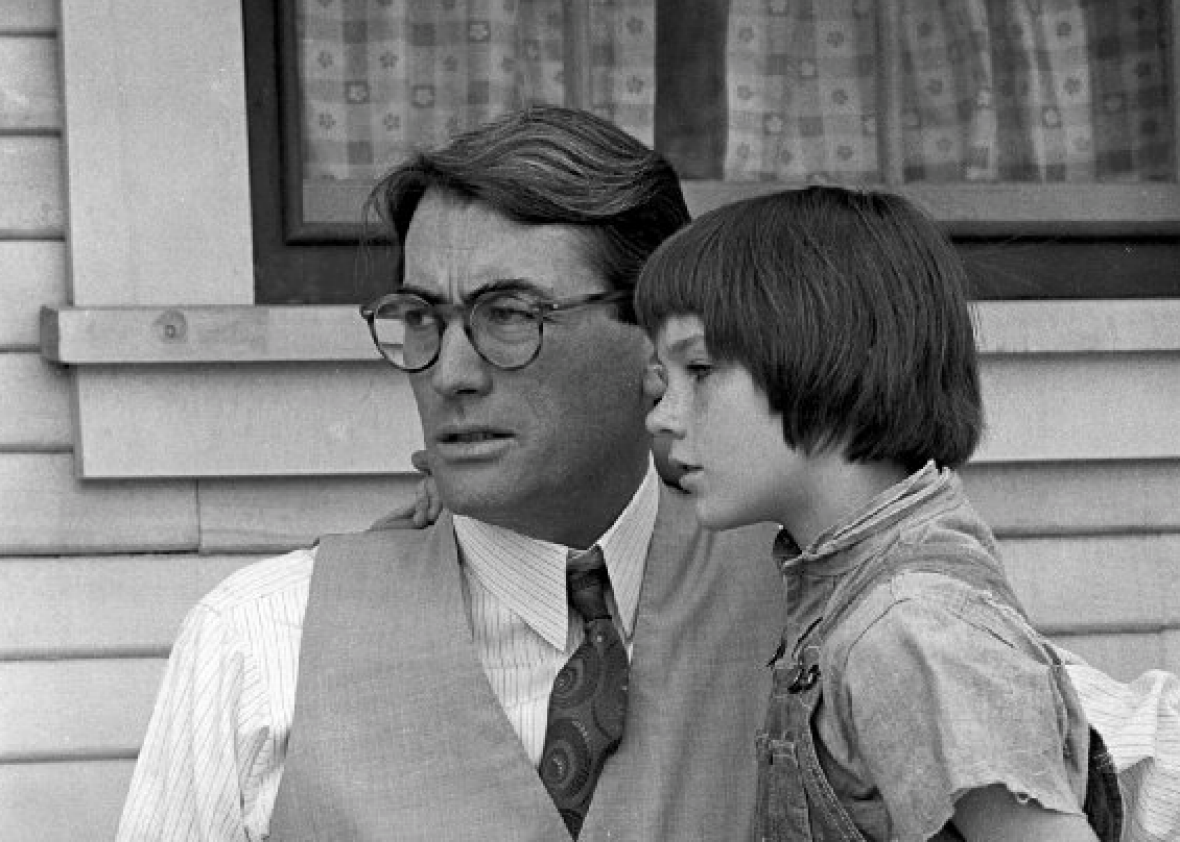Close your eyes a moment and try to picture Atticus Finch. If, like me, you haven’t read Harper Lee’s To Kill a Mockingbird in years, you probably see him as I do, his dark hair parted just off center, round tortoise shell glass perched on his nose, jawline assertive, but not aggressively so. In other words, when I imagine Atticus Finch I see Gregory Peck in the 1962 film adaptation, playing him as a steady exemplar of moral rectitude and uncomplicated goodness. My Atticus is, and always will be, the one in the movie.
I suspect I’m not alone in this feeling. Look at one of the many articles written about Lee’s newly published Go Set a Watchman and you’ll almost certainly find a picture of Peck just beneath the headline, in character or out. For a certain kind of reader, the film has all but supplanted the book, thanks in no small part to the calm charisma of its leading man. Intoning a line that appears nowhere in the novel, Peck’s Atticus tells his children, “I’m the only father you have.” For me, he’s always been the only Atticus.
But now a challenger has presented himself in the form of a less palatable interpretation of the character: the much-maligned Atticus of Go Set a Watchman. (So really, we have three different Atticuses now.) After the book was released, a furor almost immediately erupted around what the unsavory racial views of Watchman Atticus might mean for the legacy of To Kill a Mockingbird. The most obvious answer, of course, is that they mean nothing at all. As Slate’s Katy Waldman noted in her piece about the new volume, “The Atticus in To Kill a Mockingbird is a fortress, a living literary creation.” There’s no reason to think that Watchman’s Atticus reduces Mockingbird’s, or Gregory Peck’s, for that matter, simply because he arrived later. But the pervasive fear that it does mean something offers a window into today’s critical culture.
Needless to say, when a major book is released, the pressure to produce immediate analysis is intense—whether these judgments are based on actual scrutiny of the text or on early reviews written by critics. (In this case, Michiko Kaktuani’s review of Watchman in the Times, the first to call Atticus a racist, set the outrage cycle in motion days before the book hit shelves.) And so many readers are more uneasy with contradiction than ever—uncomfortable with the idea that contrary possibilities can coexist within one work of art, one story, or the mind of one author.
Because Watchman’s status is so peculiar—it comes long after Mockingbird, but was written before—its Atticus can feel more like a re-reading of the old one than a different incarnation. In this regard, many have processed Watchman’s Atticus less as a character than a callout, as if he’d been designed to shame us for admiring his more pleasant doppelganger. The debate over the two Atticuses dramatizes a crisis in our ideas about authorship, one that places undue emphasis on the authority of original intentions, even or especially when those intentions contradict one another.
It should be no surprise, then, that some jumped to reread the more familiar book in light of the new one, retroactively turning its ostensibly admirable Atticus into a secret racist. “In fact,” Laura Marsh claims in the New Republic, “there is a well-established body of scholarship on To Kill A Mockingbird that draws attention to flaws in Atticus’s character.” Most of the scholars Marsh cites, however, seem to be pointing out a more complex problem in the novel. Far from simply criticizing Finch, they’re pointing out that black voices and lives are largely absent in a text that’s been upheld as an exemplar of racial understanding. Atticus plays into these scholarly readings as an exhibit of the book’s shortcomings rather than the primary defendant in its trial.*
What’s more, even if the original literary Atticus were clearly and unquestionably racist, that fact would do nothing to erase my Atticus. Mine is a patchwork creature of the imagination, made from half-remembered bits of Lee’s prose and one stellar performance. And I like to think that my Atticus coexists comfortably with the others.
Arguments about Atticus have largely supplanted the earlier, more important moral quandary about the new book: the question of whether or not we should be reading it at all. But to some extent, the ambiguity about Atticus mirrors our uncertainty about Lee herself. Lee has been notoriously mute in the years since Mockingbird’s publication. Refusing to speak about the book or its meaning, she’s left us, mercifully, without an authoritative point of final appeal. We may never know whether the Atticus of Watchman is meant to be a continuation of the Atticus of Mockingbird, or simply a discarded rough draft of him. So instead of arguing over which Atticus is real, we’d do well to just embrace the contradiction, to question the words of Gregory Peck: He’s not “the only father” we have. And that’s OK.
*Correction, July 17, 2015: This post originally misstated that Atticus Finch was not the plaintiff in academic critiques of racism in To Kill a Mockingbird. He was not the defendant.
